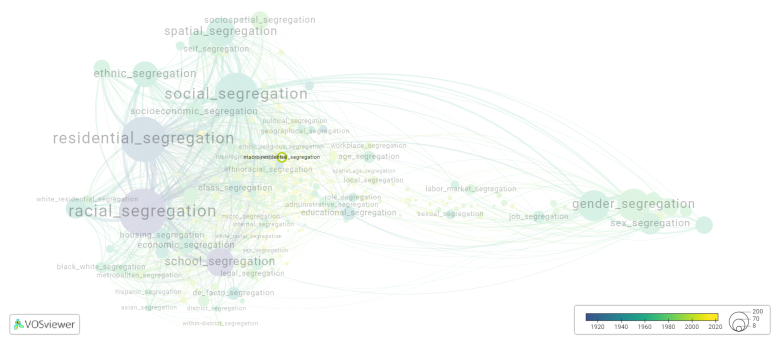Macro-residential segregation
Date and country of first publication[1][edit | edit source]
2009
United States
Definition[edit | edit source]
Macro residential segregation refers to the unequal distribution of different racial and ethnic groups across different neighborhoods or areas within a city or region. It is a pattern of segregation that occurs at the larger scale, often resulting in the concentration of certain racial or ethnic groups in specific areas while others are excluded or limited in their access to those areas.
Macro residential segregation can be influenced by various factors, including historical patterns of discrimination and exclusion, socioeconomic disparities, government policies, and cultural preferences. It is often perpetuated by systemic and structural inequalities, such as restricted housing opportunities, redlining, and discriminatory lending practices.
The consequences of macro residential segregation are far-reaching and can have significant impacts on various aspects of individuals' lives. It can lead to unequal access to quality education, healthcare, job opportunities, and resources. It can also contribute to social and economic disparities, perpetuating cycles of poverty and limiting social mobility for marginalized communities.
Efforts to address macro residential segregation often involve interventions at multiple levels, including policy changes, equitable housing initiatives, community engagement, and education campaigns aimed at challenging biases and promoting diversity and inclusion.
Synonyms[edit | edit source]
The following terms are synonymous with macro-residential segregation:
macro residential segregation.
References and literature addressing this segregation form under these synonymous terms can be found below.
See also[edit | edit source]
Related segregation forms[edit | edit source]
Macro-residential segregation is frequently discussed in the literature with the following segregation forms:
residential segregation, social segregation, urban segregation

This visualization is based on the study The Multidisciplinary Landscape of Segregation Research.
For the complete network of interrelated segregation forms, please refer to:
References[edit | edit source]
Notes[edit | edit source]
- ↑ Date and country of first publication as informed by the Scopus database (December 2023).
At its current state, this definition has been generated by a Large Language Model (LLM) so far without review by an independent researcher or a member of the curating team of segregation experts that keep the Segregation Wiki online. While we strive for accuracy, we cannot guarantee its reliability, completeness and timeliness. Please use this content with caution and verify information as needed. Also, feel free to improve on the definition as you see fit, including the use of references and other informational resources. We value your input in enhancing the quality and accuracy of the definitions of segregation forms collectively offered in the Segregation Wiki ©.
Macro-residential segregation appears in the following literature[edit | edit source]
Ward P.M. (2009). Unpackaging residential segregation: The importance of scale and informal market processes. Investigaciones Geograficas, 70(), 114-134. https://doi.org/
